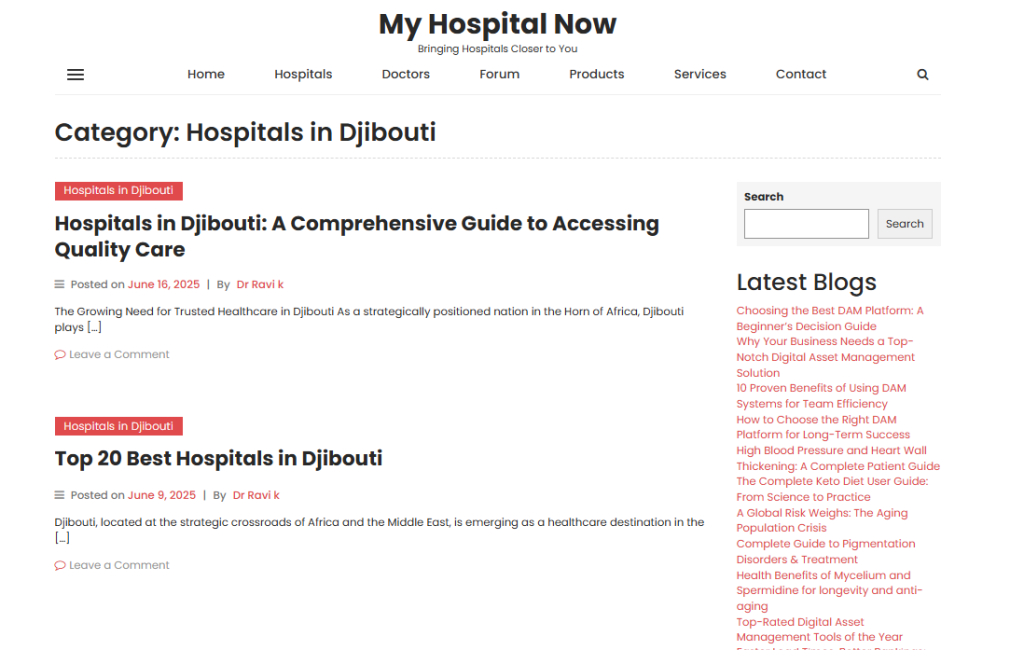
Djibouti, at the crossroads of Africa and the Middle East, is rapidly growing into a healthcare center known for its vibrant mix of cultures, strategic location, and determined investments in health. While the country faces challenges from climate, resources, and urban-rural disparities, major reforms and public-private-nongovernmental partnerships are expanding hospital access, specialty options, and digital innovation at every level. International patients and locals find both affordable public hospitals and high-quality private clinics—backed by new telemedicine, better diagnostics, and English- and French-speaking provider teams. MyHospitalnow unites these resources, offering guidance and step-by-step help for every person seeking treatment in Djibouti, from city to countryside.
Begin your health journey at:
Djibouti’s Healthcare System: Structure and Strengths
- Pyramidal Organization: The health system is structured in three levels—public, quasi-public (including military and social security medical centers), and private. These are matched to six administrative regions, each served by local hospitals, mobile health teams, and a network of rural/urban clinics.
- Public Sector: Covers roughly 71% of facilities and delivers comprehensive primary and secondary care. Djibouti City, the capital, has the best tertiary hospitals and accounts for 83% of specialist facilities and over half of all doctors nationally. First-level facilities (health posts, community clinics) provide vaccines, routine care, maternal/child screening, and basic surgery; second-level (district hospitals/polyclinics) deliver surgery, emergencies, and diagnostics; third-level hospitals offer complex care in trauma, oncology, maternity, and cardiology.
- Private Sector: A growing network in Djibouti City and major towns, with better-equipped diagnostics, specialty care (cardiac, orthopedics, fertility, dental), and shorter wait times.
- Military/Semi-Public and NGO Care: Hospitals for defense, social security, or international partners fill system gaps and bring new expertise.
- Recent Advances: Investment in new regional/district hospitals, mobile health units, vaccination and maternal health campaigns, telemedicine pilots, and the Health Management Information System (HIS) for modern patient tracking.
- International Partnerships: WHO, UNICEF, and World Bank-driven reforms focus on rural access, maternal/child health, universal health coverage pilots, and controlling infectious diseases.
Leading Hospitals and Clinics in Djibouti
| Hospital Name | City/Region | Type | Major Specialties/Strengths |
|---|---|---|---|
| Hôpital Général Peltier | Djibouti City | Public | Multispecialty, trauma, surgery, maternity, ICU, dialysis |
| Bouffard French Military Hospital | Djibouti City | Military | Surgery, trauma, advanced imaging, emergency |
| Hôpital Cheiko | Djibouti City | Public | Pediatrics, OB/GYN, trauma, emergencies |
| Centre Médical International | Djibouti City | Private | Cardiology, diagnostics, imaging, outpatient, English language |
| Regional Hospital Dr. Absieh (Ali Sabieh) | Ali-Sabieh | Public | Surgery, general med, pediatric, telehealth |
| Polyclinique Al Rahma | Djibouti City | Private | Maternity, surgery, dental, rehab, imaging |
| Hôpital Régional Tadjourah | Tadjourah | Public | Emergencies, general medicine, some diagnostics |
| Hôpital Régional Dikhil | Dikhil | Public | Trauma, surgery, maternal, community health |
| Medical Center Hassan Gouled | Djibouti City | Private | Multispecialty, rapid appointments, expat focus |
Key Specialties and Services
- Emergency and trauma medicine (modern ERs, trauma surgery, blood banking in capital)
- Maternity, neonatal care, fertility, and women’s health (dedicated delivery and NICU units)
- General and specialist surgery (orthopedics, GI, appendectomy, hernia, urology)
- Internal medicine, dialysis, endocrinology, diabetes, hypertension, chronic disease management
- Infectious disease: malaria, TB, HIV/AIDS, acute and chronic respiratory infections
- Pediatrics, routine immunizations, nutrition programs
- Oncology (limited in public, expanding in private)
- Cardiac care, imaging, advanced labs (private hospitals/urban public)
- Dental and oral surgery (mainly private clinics)
- Diagnostic imaging: X-ray, ultrasound, MRI/CT (expanding, urban focus)
- Telemedicine and digital health (emerging)
International Patient Services
- English, French, and Arabic-speaking reception, nursing, and medical teams
- Patient coordinators for appointments, insurance, pre-arrival planning, and visa documentation
- Transparent, up-front price quoting in private hospitals; government rates for public care
- Concierge offerings: travel/hotel help, local transportation, expat medical support, family counseling
- Digital follow-up/telehealth pilot projects for postoperative or chronic care
- Coordination with international embassies and insurers to streamline paperwork
Why Choose Djibouti for Healthcare?
- Rapidly strengthening network of public/private/NGO hospitals in a strategic global location
- Culturally welcoming, multilingual, and patient-focused teams
- Competitive pricing and up-front estimates, high satisfaction for maternity/trauma/expat needs
- International partnerships ensuring quality and modern care approaches
- Digital systems for faster records, scheduling, and telemedicine outreach
Patient Testimonials
- “Emergency care at Peltier Hospital was immediate and responsive—English-speaking team guided everything.” – Jean-Marc N.
- “Private clinics arranged all my cardiology diagnostics and outpatient rehab—excellent service for foreigners.” – Emanuela B.
- “Bouffard Military Hospital managed my surgery with professionalism and clear communication.” – Noureddine F.
- “In Ali-Sabieh, I received quality postnatal support and telehealth check-ins through the regional hospital.” – Zahra H.
Step-by-Step Guide for International Patients
- Browse MyHospitalnow’s Djibouti hospital listings by specialty, region, and trusted recommendations.
- Submit records and care details for tailored hospital/clinic matches and transparent price quotes.
- Coordinate travel, lodging, insurance, and administrative prep with coordinators or direct hospital teams.
- Arrive for admission—your team provides language support and personalized guidance throughout care.
- Continue digital or in-person follow-up, second opinions, and aftercare as needed.
Frequently Asked Questions
Are Djibouti’s hospitals internationally accredited?
Major hospitals follow national, French, and international standards; some private clinics are seeking accreditation.
Is English spoken in hospitals?
Yes—especially in private clinics, government hospitals in Djibouti City, and expat/military centers.
Are costs clear for foreign patients?
Absolutely—private sector uses clear quotes, and public hospital fees are subsidized and posted.
What specialties are available?
Emergency, trauma, surgery, maternity, pediatrics, diagnostics, dental, and emerging oncology, cardiac, and telemedicine services.
Will hospitals help with travel, visa, and aftercare?
Yes; coordinators and patient services facilitate logistics, accommodation, and ongoing recovery support.
Conclusion
Djibouti’s hospitals are at the crossroads of innovation and tradition, expanding quality, comfort, and access for every patient. With MyHospitalnow, you receive up-to-date information, end-to-end booking, and a support network that makes medical care in Djibouti clear and accessible, no matter where you’re from.